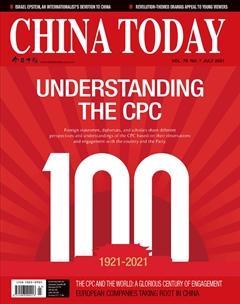Chinese Wisdom on the Modernization of Governance
2021 marks the centenary of the founding of the Communist Party of China (CPC). In this year, China is also completing the building of a moderately prosperous society in all respects. That means after a century of endless exploration and unremitting struggles, the CPC has embarked on a path pursuing the modernization of national governance with Chinese characteristics, honoring its commitment to build a prosperous and strong modern China.
In 2049, when Chinese people celebrate the centennial of the founding of the Peoples Republic of China, China will have become a prosperous, democratic, culturally advanced, and harmonious socialist modern country. To adhere to and improve the socialist system with Chinese characteristics and advance the modernization of China and its system and capacity for governance, the Central Committee of the CPC has set an overall goal to fully realize the modernization of the national governance system and governance capabilities. By achieving this goal, it will make the Chinese socialist system more consolidated and fully demonstrate its strength.
While working towards the great rejuvenation of China in 2049 and the comprehensive construction of a modern and strong socialist country, what kind of modernization does China need, and how will it achieve that goal? During the process of forging ahead towards the modernization of national governance, what new starting point is China standing at presently? And what challenges will China face?
The books author, Tian Yingkui, is a professor at the Party School of the CPC Central Committee, also known as the National Academy of Governance. Tian has focused his research on macro-economy, finance, institutional reform, and economic policies. In this book, he chose modernization as the main topic to discuss how to solve the problems which have emerged in the modernization of national governance in areas of economy, politics, culture, society, and ecology, and achieve a modern governance that is fair, efficient, sustainable, and has high quality. It is a must read for those who are interested in understanding Chinas goals of advancing the modernization of its system and capacity for governance by adhering to and improving the socialist system with Chinese characteristics.
The book is divided into eight chapters that touch on such topics as the realization of the great rejuvenation of the Chinese nation in 2049, Chinas economic, political, cultural, social and environmental modernization, international governance, and the mission of the Party towards national rejuvenation. In the first chapter, the author points out clearly the importance of building a modern, peoplecentered governance system. He then explains in detail how to build a modernized governance system which ensures economic development and fair distribution; how to realize the modernization of public power via improving democratic politics and the rule of law; how to achieve the modernization of a cultural governance ensured by education, science, and technology; how to carry out the modernization of social governance that features fairness, justice, and the improvement of peoples livelihood; and how to complete the modernization of ecological governance considering resource conservation and green development. In the last two chapters, the author discusses Chinas concepts on global governance, which aims to build a community with a shared future for mankind, and answers the question of how the CPC will lead Chinese people towards national rejuvenation through the modernization of Chinas system and capacity for governance in the new era.
By introducing the basic content and fundamental strategies of Chinas governance, the author summarizes Chinas experience, explores its unique development path, and reveals how China, being a developing country with a large population, can coordinate and properly handle all kinds of problems in the areas of economy, politics, society, culture, and environment during the process of realizing socialist modernization. The author also explores how Chinas governance reflects the laws governing development in the modern era, so as to move towards a society which develops with a respect for the spirit of science and democracy, while obeying the rule of law. Only with this kind of governance can China satisfy the peoples growing needs for a better life, represent the wisdom and strength of the Chinese nations modernized governance, and achieve the goal of becoming a prosperous, strong, democratic, culturally advanced, and harmonious modern socialist country.
A consensus reached after analyzing history is that: When a country has a higher level and stronger capacity for governance, it develops in a healthier manner with a prosperous economy and society; but when a country has a poor and weak governance, it loses its ability to guarantee its economic and social development. The modernization of national governance is the common pursuit of all countries, but different countries have completely different institutional forms, path choices, and methods for reaching that end goal. The CPC can neither find ready-made answers in the classic works of Marxism-Leninism, nor borrow existing models from the political practices of other countries. The only way is to proceed with Chinas national condition, change with the times, adopt methods that combine the top-level design and gradual adjustments, and blaze a new path for the modernization of national governance with Chinese characteristics.
Zheng Yongnian, a wellknown scholar of China studies who was a professor and director of the East Asian Institute, National University of Singapore, pointed out in a speech he delivered in October 2014 that the CPC has been in power for a long time and is very good at formulating long-term development goals, which means a lot to its long-lasting governance. Just as Zheng observed, two months later, Chinese President Xi Jinping proposed the four-pronged comprehensive strategy, namely to make comprehensive moves to finish building a moderately prosperous society in all respects, deepen reform, advance law-based governance, and strengthen Party selfgovernance. This strategic deployment is like a strategy deployment in the game Go, in which visionary players must be always adept at giving full play to the overall function of every piece and make full use of the time and position, so as to maximize the effectiveness of limited resources.

